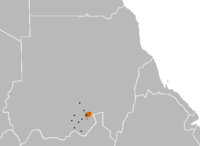User:Tammy083
- Note: this template is for spoken languages. For sign languages, see this template.
Tegali (also spelled Tagale, Tegele, Tekele, Togole) is a Kordofanian language in the Rashad family, which belongs to the larger Niger–Congo phylum. (Greenberg 1963, Schadeberg 1981, Williamson & Blench 2000).[1] It is spoken in South Kordofan state, Sudan.
| Tegali | |
|---|---|
| Tagale, Tegele, Tekele, Togole | |
 | |
| Native to | Sudan |
| Region | South Kordofan |
| Ethnicity | Tagale |
Native speakers | (35,700 cited 1984)[1] |
Kordofanian
| |
| Dialects |
|
| Language codes | |
| ISO 639-3 | ras [2] |
| Glottolog | tega1236 Tegali |
Classification[edit]
The Rashad family of language consists of two dialect clusters, "Tegali" and "Tagoi". They are spoken on two mountain ranges to the north and north-west of Rashad.[2] These languages are spoken in the Tegali Hills in the north-east of the Nuba Mountains, the home of the former "Tegali Kingdom".[3]
Dialects/Varieties[edit]
Tegali has three varieties, Rashad (Gom, Kom, Kome, Ngakom), Tegali, and Tingal (Kajaja, Kajakja). Ethnologue states that Rashed and Tegali dialects are nearly identical. Tucker and Bryan list Rashad as almost identical to Tegali, "perhaps a mere variation of one language"; however, Greenberg lists it as a separate language. Welmers suggests Tingal as a dialect of Tegali; Tucker and Bryan report this as different from Tegali and Rashad, but as definitely belonging to the Tegali branch.
Geographic distribution[edit]
There are 35,700 native speakers of Tegali in South Kordofan state, Sudan.[4] Speakers are distributed in the hills between the Rashud-Rashad and Rashad-Umm Ruwaba roads, with a few outlying hills west of Rashad (including Tagoi and Tarjok) and scattered hills south of Rashad.[5]
Dialects/Varieties[edit]
Among the three dialects, Tegali has about 16,000 speakers located on the Tegali range. Rashad has about 5,000 speakers in the Rashad hills in the southern part of the Tegali range, also in Rashad town. Tingal (Kajakja) has about 2,100 speakers.[5]
Grammar/Vocabulary[edit]
Tegali is closely related to Tagoi. The most conspicuous difference between the two dialect clusters is that Tagoi has a complex system of noun classes while Tegali does not. Tegali and Tagoi share about 70% basic vocabulary (100-word list). Different explanations exist for why Tegali dialects lack of noun class system. Greenberg (1963), who excludes the possibility of mass borrowing of basic vocabulary in Tegoi, regards the two dialect clusters as closely related and assumes the loss of noun classes in the Tegali dialects.[6]
Examples[edit]
Numeral System[edit]
Tegali has a counting system similar to that of Tagoi. But now they seemed have developed a more complete numeral system. There is an option for the number 20 'fəŋəndən rəkkʊ'.[7]
References[edit]
- ^ "Occasional Papers in the Study of Sudanese Languages No. 11". SIL International. Retrieved 2017-04-30.
- ^ Schadeberg, Thilo C.; Elias, Philip (1979). A description of the Orig language: (Southern Kordofan), based on the notes of Fr. Carlo Muratori. Tervuren: Musée royal de l'Afrique centrale. Musee Royal De L'afrique Centrale. p. 3.
- ^ Stevenson, R. C. (January 1964). "LINGUISTIC RESEARCH IN THE NUBA MOUNTAINS—II". Sudan Notes and Records. 45: 79–102.
- ^ "Tegali". Ethnologue. Retrieved 2017-04-28.
- ^ a b Voegelin, C.F.; Voegelin, F.M. (May 1964). "Languages of the World: Indo-Pacific Fascicle One". Anthropological Linguistics. 6: 195–196.
- ^ Schadeberg, Thilo C. (1981). A survey of Kordofanian. Hamburg: Helmut Buske. pp. 67–80.
- ^ Norton, Russell (January 25, 2008). "Tegali, Sudan". Numeral Systems of the World's Languages.
{{cite web}}: Cite has empty unknown parameter:|dead-url=(help)
External links[edit]
- Tegali at the Endangered Languages Project
- Simons, Gary F. and Charles D. Fennig (eds.). 2017. Ethnologue: Languages of the World, Twentieth edition. Dallas, Texas: SIL International.
- Hammarström, Harald & Forkel, Robert & Haspelmath, Martin. 2017. Glottolog 3.0. Jena: Max Planck Institute for the Science of Human History.
